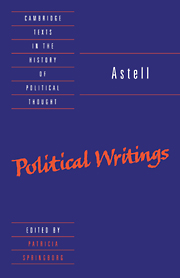Book contents
- Frontmatter
- Contents
- Acknowledgements
- Introduction
- Chronology of principal events in Mary Astell's life
- Bibliographic essay
- Select bibliography
- Reflections upon Marriage
- A Fair Way with the Dissenters and their Patrons
- An Impartial Enquiry into the Causes of Rebellion
- Biographical notes
- Index
- Cambridge Texts in the History of Political Thought
A Fair Way with the Dissenters and their Patrons
Published online by Cambridge University Press: 05 June 2012
- Frontmatter
- Contents
- Acknowledgements
- Introduction
- Chronology of principal events in Mary Astell's life
- Bibliographic essay
- Select bibliography
- Reflections upon Marriage
- A Fair Way with the Dissenters and their Patrons
- An Impartial Enquiry into the Causes of Rebellion
- Biographical notes
- Index
- Cambridge Texts in the History of Political Thought
Summary
Note on the Text
A Fair Way with the Dissenters and their Patrons of 1704 was Astell's answer to Daniel Defoe's anonymous More Short-Ways with the Dissenters of the same year. It belongs to the pamphlet skirmishing over the Occasional Conformity debate, initiated by the introduction of the parliamentary bill in 1702 to permit Dissenters who attended the Anglican Church at least once a year to enjoy the privileges of government office. Although the Corporation and Test Acts of 1673 had not been repealed, an entire class of occasional conformists had grown up, to whom no serious objections were made until the flagrant conduct of Sir Humphrey Edwin, a Presbyterian Lord Mayor of London, drew attention to the matter by attending in full regalia both Dissenting and Anglican services on the same Sunday. Opening shots were fired in what was to become a pamphlet war by Daniel Defoe, whose pamphlet, An Enquiry into the Occasional Conformity of Dissenters, of 1698, opposed any conformity on the Dissenters’ part. In 1701 the new Lord Mayor of London, Sir Thomas Abney, repeated the performance of his predecessor, providing the occasion for republication of Defoe's tract; this time he replaced the Preface to the mayor with one to John Howe (q.v.), pastor of the Dissenting church to which Abney belonged, and a supporter of Occasional Conformity as a conciliatory measure.
- Type
- Chapter
- Information
- Astell: Political Writings , pp. 81 - 128Publisher: Cambridge University PressPrint publication year: 1996
- 1
- Cited by



